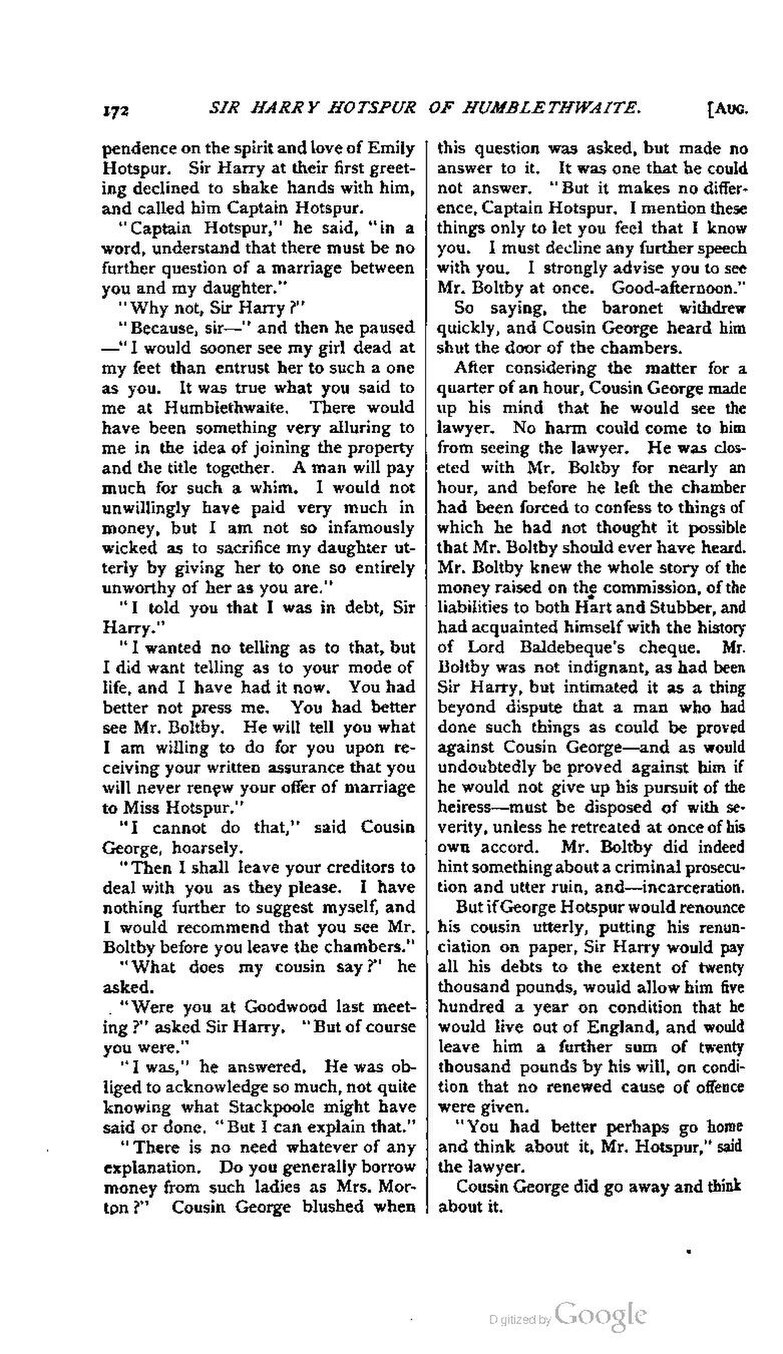pendence on the spirit and love of Emily Hotspur. Sir Harry at their first greeting declined to shake hands with him, and called him Captain Hotspur.
"Captain Hotspur," he said, "in a word, understand that there must be no further question of a marriage between you and my daughter."
"Why not, Sir Harry?"
"Because, sir—" and then he paused—"I would sooner see my girl dead at my feet than entrust her to such a one as you. It was true what you said to me at Humblethwaite. There would have been something very alluring to me in the idea of joining the property and the title together. A man will pay much for such a whim. I would not unwillingly have paid very much in money, but I am not so infamously wicked as to sacrifice my daughter utterly by giving her to one so entirely unworthy of her as you are."
"I told you that I was in debt, Sir Harry."
"I wanted no telling as to that, but I did want telling as to your mode of life, and I have had it now. You had better not press me. You had better see Mr. Boltby. He will tell you what I am willing to do for you upon receiving your written assurance that you will never renew your offer of marriage to Miss Hotspur."
"I cannot do that," said Cousin George, hoarsely.
"Then I shall leave your creditors to deal with you as they please. I have nothing further to suggest myself, and I would recommend that you see Mr. Boltby before you leave the chambers."
"What does my cousin say?" he asked.
"Were you at Goodwood last meeting?" asked Sir Harry. "But of course you were."
"I was," he answered. He was obliged to acknowledge so much, not quite knowing what Stackpoole might have said or done. "But I can explain that."
"There is no need whatever of any explanation. Do you generally borrow money from such ladies as Mrs. Morton?" Cousin George blushed when this question was asked, but made no answer to it. It was one that he could not answer. "But it makes no difference, Captain Hotspur. I mention these things only to let you feel that I know you. I must decline any further speech with you. I strongly advise you to see Mr. Boltby at once. Good-afternoon."
So saying, the baronet withdrew quickly, and Cousin George heard him shut the door of the chambers.
After considering the matter for a quarter of an hour, Cousin George made up his mind that he would see the lawyer. No harm could come to him from seeing the lawyer. He was closeted with Mr. Boltby for nearly an hour, and before he left the chamber had been forced to confess to things of which he had not thought it possible that Mr. Boltby should ever have heard. Mr. Boltby knew the whole story of the money raised on the commission, of the liabilities to both Hart and Stubber, and had acquainted himself with the history of Lord Baldebeque's cheque. Mr. Boltby was not indignant, as had been Sir Harry, but intimated it as a thing beyond dispute that a man who had done such things as could be proved against Cousin George—and as would undoubtedly be proved against him if he would not give up his pursuit of the heiress—must be disposed of with severity, unless he retreated at once of his own accord. Mr. Boltby did indeed hint something about a criminal prosecution and utter ruin, and—incarceration.
But if George Hotspur would renounce his cousin utterly, putting his renunciation on paper, Sir Harry would pay all his debts to the extent of twenty thousand pounds, would allow him five hundred a year on condition that he would live out of England, and would leave him a further sum of twenty thousand pounds by his will, on condition that no renewed cause of offence were given.
"You had better perhaps go home and think about it, Mr. Hotspur," said the lawyer.
Cousin George did go away and think about it.
